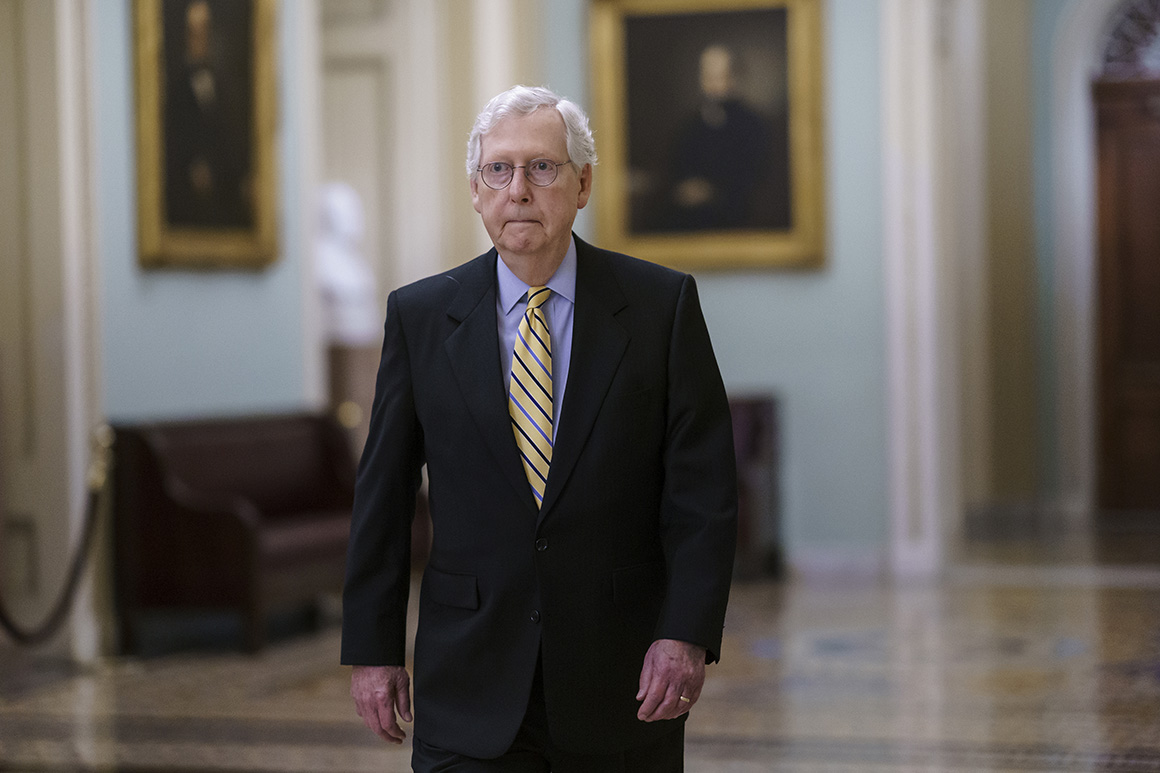Senate Democrats kicked off the marathon known as "vote-a-rama" on Tuesday to deliver their next filibuster-proof ticket to passing major legislation against the will of their GOP colleagues.
Republican senators began firing off a volley of hot-button amendments Tuesday afternoon, in their last legislative hurrah before senators depart for the August recess that was already supposed to be underway. The GOP plans to drag the voting session well into the night, peppering the majority party with dozens of symbolic amendments on issues like school reopening, hydraulic fracturing and policies for handling immigrants who are sick with coronavirus.
The vote-a-rama will culminate with a final roll call — likely late Tuesday or in the wee hours of Wednesday — on adoption of a 92-page framework for Democrats’ $3.5 trillion package of climate and social initiatives, including subsidized child care, expanded Medicare and paid family and medical leave benefits. Adoption of the budget measure will unlock the reconciliation process, which empowers the majority party to eventually clear the final bill with just 51 votes in the Senate, rather than the usual 60-vote hurdle.
Sen. Lindsey Graham (R-S.C.), speaking on the floor for the first time since his breakthrough Covid infection, promised an unpleasant evening for Democrats as political punishment for proposing a budget measure he called “a dream for those who want to socialize America.”
“Yes, sir. We’re going to have one hell of a fight,” said Graham, the top Republican on the Senate Budget Committee. “I don’t know how long we’re going to be here, but as long as it takes. America is worth fighting for, and America as we know it is at risk in this budget resolution.”
Right off the bat, Democrats joined Republicans in unanimously adopting a non-binding provision, offered by Sen. John Barrasso (R-Wyo.), to reject any effort under the Green New Deal that would “ship” U.S. jobs overseas, send electricity and gas prices “soaring” or make the nation “increasingly dependent on foreign supply chains.”
Senate Budget Chair Bernie Sanders (I-Vt.) said he had “no problem” supporting the GOP amendment because it “has nothing to do with the Green New Deal!”
Lawmakers also unanimously adopted an amendment from Senate Minority Whip John Thune that targets a Democratic plan to go after dynastic wealth.
Thune’s amendment opposes an end to the tax exemption that allows the wealthy to pass assets on to heirs tax-free by forgiving capital gains taxes on things like company stock and land when people die. The Biden administration is proposing to allow farms and small businesses to postpone paying the tax until the business or farm is sold or ceases to be family-owned and operated.
Another provision offered by Sen. Tom Carper (D-Del.) that would create a reserve fund to address climate change was approved largely along party lines.
Senate Minority Leader Mitch McConnell also vowed a fusillade of amendments related to national security, military funding, school reopening, federal funding for abortions and much more.
“If even our colleagues who claim they are moderates want to follow the far left off this cliff, well, that’s their prerogative,” the Kentucky Republican said on the floor Tuesday. “But we’re going to argue it out right here on the floor at some length. Every single senator will be going on record over and over and over.”
The amendment marathon will be the Senate’s third this year, after Democrats deployed the reconciliation process to pass President Joe Biden’s $1.9 trillion pandemic relief package in March.
After Tuesday’s vote-a-rama ends, Democrats are expected to approve the budget resolution that once again launches the privileged process for final passage of their social spending bill.
Before that massive party-line measure could be sent off to Biden in the coming months, the Senate will have to endure at least one more vote-a-rama — an ordeal that could potentially be more painful than the amendment spree this week, since trillions of dollars in Democratic priorities will be closer to the finish line and senators will be proposing tweaks to a much fuller legislative text than the budget framework currently under consideration.
“I’ll probably have more amendments to the spending-and-taxation orgy bill," Sen. John Neely Kennedy (R-La.) said, referring to the final package.
Before passage of the American Rescue Plan earlier this year, the Senate embarked on two vote-a-ramas that lasted all night, with lawmakers taking more than three dozen votes each time. The Senate’s most robust vote-a-rama was in 2008, when senators voted on 44 amendments.
The latest torment follows the long-awaited release of Democrats’ $3.5 trillion budget framework on Monday — a price tag that might ultimately have to come down to appease Senate moderates. The budget measure instructs a swath of committees to begin drafting the pieces of Biden’s plan, with a flexible deadline of Sept. 15.
Earlier Tuesday, the Senate voted 69-30 to pass a $550 billion bipartisan infrastructure bill. Democratic leaders have pledged to move the infrastructure package and their reconciliation measure along two tracks at the same time, tying together the success of both bills.
Sanders called consideration of the measure one of the most "important debates that we have ever had" in the Senate.
Democrats’ multitrillion-dollar spending package would bolster Medicare to cover vision, dental and hearing benefits for seniors — a major priority for Sanders. It aims to extend Medicaid to Americans in Republican-led states that have refused to expand the health program for low-income individuals.
It would keep new Obamacare subsidies, too, and make in-home care available to more people.
To help offset the cost of the plan, Democrats are proposing to raise taxes on top earners, corporations, overseas profits and capital gains. "$3.5 trillion, that’s a lot of money. It is, " Sanders acknowledged.
"Our Republican friends say we’re going to be raising taxes. Yeah, you’re right, we are. But we’re going to be raising taxes on the wealthiest people in this country, something which is long overdue," he said.
The measure also instructs the Senate Judiciary Committee to find a pathway to citizenship for undocumented immigrants. That directive could ultimately run into resistance from the Senate parliamentarian — the upper chamber’s procedural referee — who will decide which provisions pass muster with certain reconciliation restrictions.
Democrats did not include a debt ceiling increase in their budget resolution, instead daring Republicans to reject a bipartisan solution to the cap on the nation’s borrowing authority. The Treasury Department is expected to run out of money sometime from September to November.
Toby Eckert contributed to this report.





















